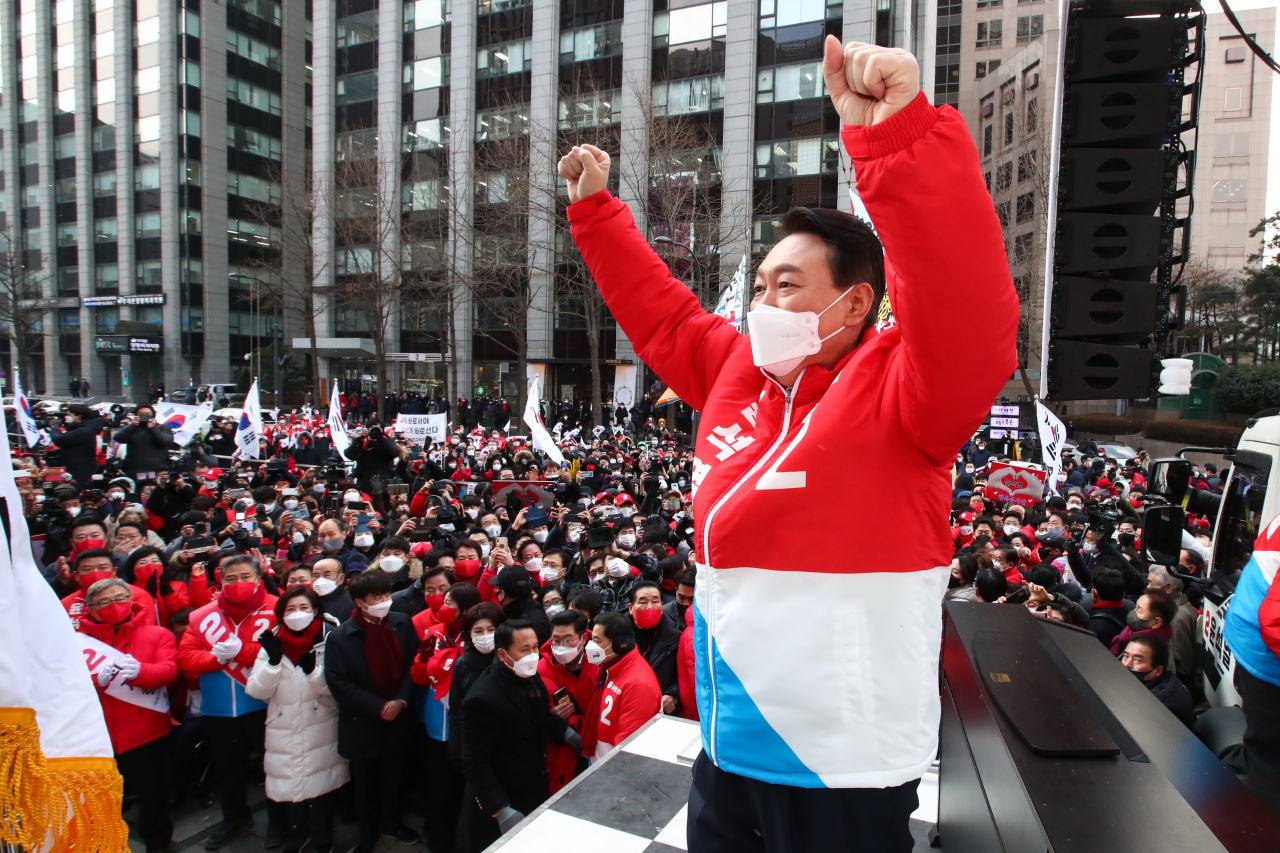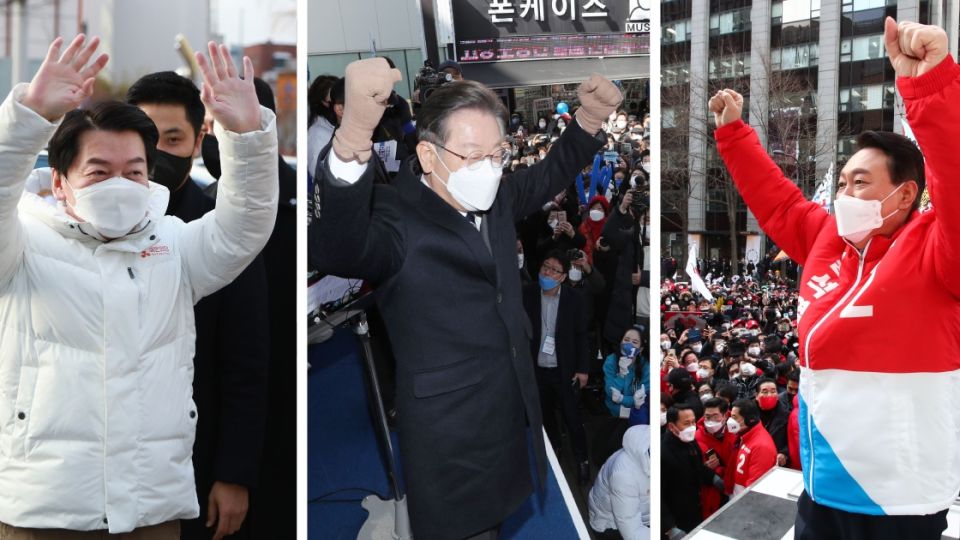February 15, 2022
SEOUL – With the official canvassing period for this year’s presidential election kicking off on Tuesday, contenders traveled to regions across the country in colorful uniforms to reach out to voters.
The presidential candidates currently leading the race, Lee Jae-myung of the ruling Democratic Party of Korea and Yoon Suk-yeol of the main opposition People Power Party, traversed between the cities of Seoul and Busan on their first canvassing day.
Ahn Cheol-soo of the minor opposition People’s Party traveled to Daegu and cities in North Gyeongsang Province, and Sim Sang-jung of the minor progressive Justice Party traveled to Jeonju and cities in the southwestern regions.

Presidential candidate Lee Jae-myung of the ruling Democratic Party of Korea poses in front of supporters on a makeshift stage of a campaign vehicle in Daegu on Tuesday. (Yonhap)
Social integration, economy-first: Lee
Lee was the first to kick off his canvassing activity at Busan Port at midnight on Tuesday.
“I promise to be a top commander for the country to overcome crises, and a capable, economy-first president. I will also be a president for the integration of society, where people are not divided, but hold each others’ hands for equality,” Lee said in his public speech in front of Busan Port.
Lee also visited the port’s Vessel Traffic Service to speak with maritime authorities and export vessel workers.
In the morning, Lee stood on a makeshift stage of a canvassing truck in front of Bujeon Station in Busan. Addressing a city widely viewed as the rival conservative faction‘s home turf, Lee promised to create an “integrated government” to hire talent regardless of their political background.
“When I see good policies, I will implement them, regardless of who came up with it. Even if it is a policy from Hong Joon-pyo or (former president) Park Chung-hee, I will use them if they are good,” Lee said, referring to two figures from the opposition conservative bloc. Hong Joon-pyo is a five-term lawmaker of the main opposition People Power Party, and Park Chung-hee is the late former president and a symbolic figure for the conservative faction.
Lee traveled north to stop in Daegu, and then in Daejeon before concluding the day at Gangnam Express Bus Terminal in Seoul.

Presidential candidate Yoon Suk-yeol of the main opposition People Power Party poses in front of supporters on a makeshift stage of a campaign vehicle in Cheonggye Square in central Seoul on Tuesday. (Yonhap)
Regime change to normalize state: Yoon
Yoon of the main opposition People Power Party took the reverse route of his rival Lee, starting his canvassing from Seoul on Tuesday.
Yoon’s first stop was Seoul National Cemetery, where he paid tribute to deceased patriots at 9 a.m.
He then moved to Cheonggye Square in central Seoul to announce the start of his canvassing day.
In a uniform with his name printed on it and in the party’s symbolic red color, Yoon stood on a cavassing truck stage and promised “to normalize state affairs and the economy ruined by the incumbent Moon Jae-in administration.”
“This year’s presidential election will be a trial on corruption and incompetence. We will put the corrupt and incapable government of the ruling Democratic Party of Korea on trial and pursue regime change,” Yoon said.
“I promise to take care of people’s livelihoods and also support small business operators suffering from the COVID-19 crisis.”
Denouncing the incumbent government, Yoon also vowed to protect the country from North Korea’s missile provocations and other outer forces.
He then moved to Daejeon and Daegu to reach out to the electorate in both cities. He concluded his canvassing for the day in Busan, speaking with young voters there.

Presidential candidate Ahn Cheol-soo of the minor opposition People’s Party speaks in front of supporters for his election campaign in Daegu, North Gyeongsang Province on Tuesday. (Yonhap)
Country for young people: Ahn
Ahn of the minor centrist opposition People’s Party began Tuesday in Daegu, greeting people going to work.
The candidate attacked Lee and Yoon from the two major parties, referring to them as legal professionals for the home market.
“All that domestic legal professionals do is make punishments against the past,” Ahn said, referring to Lee and Yoon’s respective past positions as lawyer and prosecutor. “Domestic legal professionals who have only focused on the past cannot see the future. They cannot see because they do not know.”
He claimed he is passionate about practicing politics for young people.
“I began politics to dive into issues related to young people. There are three things I want to do that are the most important,” he said, explaining he will create jobs for young people and make Korea a nation of fairness. He added that he would stop populist polices, targeting the two frontrunners Lee and Yoon.
Ahn then visited the birthplace of former president Park Chung-hee. When asked by reporters whether Yoon has contacted him regarding his suggestion for a political merger, Ahn said he is waiting for an answer.
“The candidate should respond with an answer. As the suggestion was made by a presidential candidate, the presidential candidate of (the People Power Party) should say ‘Yes’ or ‘No,’” he said. “I hope (to hear from Yoon) as soon as possible.”
While canvassing at Joongang Market near Gumi Station, Ahn stressed his edge as a candidate from a minor political party. He contrasted himself against Lee and Yoon, who are from the two major political parties.
“We should look at the person, not the political party. Some say (candidates) should be backed by power. But on the contrary, when candidates are backed by power, they have more people to repay after winning the election,” Ahn said.
Ahn will move to Andong, North Gyeongsang Province for more canvassing, followed by a stop in Yeongju, North Gyeongsang Province where he will meet with the elders of the family clan that shares his family name.

Presidential candidate Sim Sang-jung of the minor progressive Justice Party poses in front of supporters on a makeshift stage of a campaign vehicle in Jeonju, North Jeolla Province on Tuesday. (Yonhap)
Putting end to two-party politics: Sim
Sim Sang-jung, the candidate from the minor progressive Justice Party, began the three-week election campaign race at the KTX Honam-line platform in central Seoul at 5 a.m.
“I am the only candidate who can put a stop to the 34-year history of two-party politics. I hold the mission of transformation for Korea. I, Sim Sang-jung, promise to take responsibility for people’s lives and to protect the future of Korea,” she said at the platform.
She moved to Iksan, North Jeolla Province to meet with people going to work, followed by a meeting with a labor union in the area.
Shim then went to Jeonju and held a ceremony commemorating her campaign.
“If the election proceeds like this, the lives of people will worsen and national dignity will fall. I will put a stop to the historic regression of Korea,” she said.
The final stop of Tuesday is Gwangju. Sim will visited the memorial altar for the victims of an accident at a builder’s construction site in Gwangju, and then have an interview with a local broadcaster.
Loudspeakers, canvassing trucks
It is only during the legally designated canvassing period that contenders in a national election can promote themselves openly, using advertisement posters and items with their names.
For this year’s presidential election, the official canvassing period starts from Tuesday and ends on March 8, a day before the election on March 9.
During the canvassing period, the candidate, their family and election clerks can use canvassing items featuring the candidate’s name, and distribute print advertising materials and name cards.
Candidate posters and placards can be posted in public in accordance with the election law.
The nominees can also deliver open speeches, hold public debates, and release broadcast advertisements on all channels including TV and the internet.
They are also allowed to use loudspeakers in public, operate canvassing trucks, and stand on makeshift stages to address the public.
All of these activities are banned before the official canvassing period.


